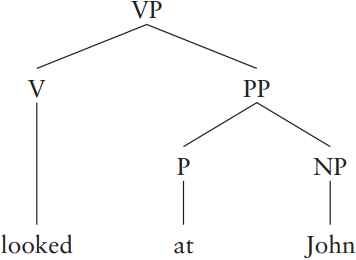


 Grammar
Grammar
 Tenses
Tenses
 Present
Present
 Past
Past
 Future
Future
 Parts Of Speech
Parts Of Speech
 Nouns
Nouns
 Verbs
Verbs
 Adverbs
Adverbs
 Adjectives
Adjectives
 Pronouns
Pronouns
 Pre Position
Pre Position
 Preposition by function
Preposition by function 
 Preposition by construction
Preposition by construction
 Conjunctions
Conjunctions
 Interjections
Interjections
 Grammar Rules
Grammar Rules
 Linguistics
Linguistics
 Semantics
Semantics
 Pragmatics
Pragmatics
 Reading Comprehension
Reading Comprehension|
Read More
Date: 2-8-2022
Date: 2025-03-23
Date: 2023-08-28
|
govern (v.)
A term used in GRAMMATICAL analysis to refer to a process of SYNTACTIC linkage whereby one WORD (or word-CLASS) requires a specific MORPHOLOGICAL FORM of another word (or class). For example, PREPOSITIONS in Latin are said to ‘govern’ NOUNS, making a certain case form obligatory (e.g. ad plus ACCUSATIVE). The notion is, accordingly, not readily applicable to a language like English, where case endings are few – to say that, in the man kicked the ball, kicked ‘governs’ the ball is true only in a loose SEMANTIC sense (and, even then, it is debatable whether this is a valid notion of government, when the relationship between other ELEMENTS is considered: almost any pairs of elements, e.g. the man and kicked, might be said to be displaying government, in this sense). The term is usually contrasted with AGREEMENT, where the form taken by one word requires a corresponding form in another.
In GENERATIVE grammar, a RULE is said to be governed or ungoverned depending on whether it does or does not have LEXICAL exceptions. For example, because not all ACTIVE TRANSITIVE SENTENCES take the PASSIVE (e.g. They have a car, The hat suits you), the passivization rule would be said to be ‘governed’. An example of an ungoverned rule is REFLEXIVIZATION

(e.g. I shaved myself, etc.). In later generative grammar, the conditions which determine whether one CONSTITUENT governs another were made more EXPLICIT. When several possible NODES C-COMMAND a constituent, the governor is the lowest of these nodes in the TREE (i.e. the ‘minimal’ node), as long as there is no intervening NOUN PHRASE or S-bar (cf. the conventions of X-BAR syntax). For example, in the tree representing looked at John, both looked and at c-command John; but only at is said to ‘govern’ John (looked John not being possible), i.e. to be the governing node. Governing nodes are noun, VERB, ADJECTIVE, preposition, TENSE and POSSESSIVE.
In relation to GOVERNMENT-BINDING THEORY, a governing category is the minimal structure (noun phrase or sentence) within which the relationships of binding obtain. X is the governing category for Y, where X is N, V, A, P, or AGR, if and only if X and Y are DOMINATED by exactly the same maximal PROJECTIONS (full phrasal categories). When an empty category is governed by a CO-INDEXED category, it is said to be ‘antecedent-governed’ (important for the EMPTY CATEGORY PRINCIPLE).
In DEPENDENCY grammar, the governor refers to the superordinate NODE in a dependency tree, which ‘governs’ or ‘controls’ a set of ‘dependent’ nodes. Each combination of governor and dependent defines a specific structural relationship. For example, the verb is seen as the governor of the noun phrases occurring in CLAUSE STRUCTURE, and each verb/noun-phrase combination specifies a syntactic RELATION, e.g. SUBJECT, INDIRECT OBJECT. In the phrase up the tree, up governs tree, and tree governs the. Because of the possibility of ambiguity with sense above, some linguists use the term ‘controller’ instead of ‘governor’.
|
|
|
|
دخلت غرفة فنسيت ماذا تريد من داخلها.. خبير يفسر الحالة
|
|
|
|
|
|
|
ثورة طبية.. ابتكار أصغر جهاز لتنظيم ضربات القلب في العالم
|
|
|
|
|
|
|
سماحة السيد الصافي يؤكد ضرورة تعريف المجتمعات بأهمية مبادئ أهل البيت (عليهم السلام) في إيجاد حلول للمشاكل الاجتماعية
|
|
|